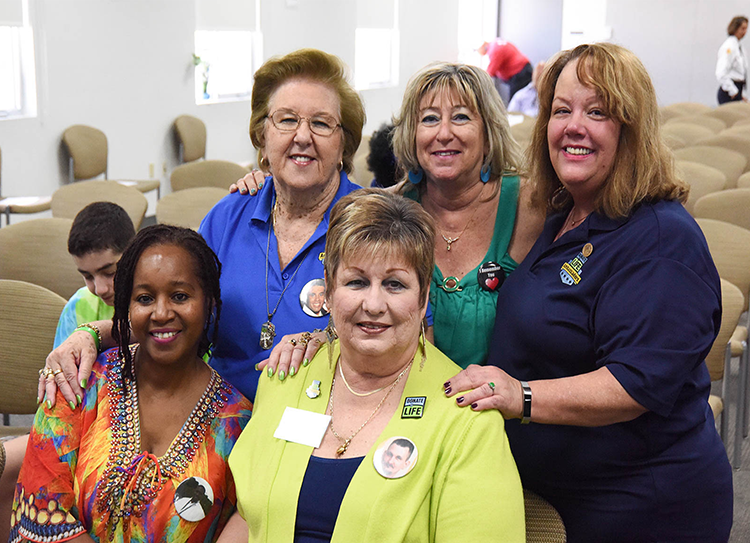Bereavement Resources
Sharon S., Mother of Joshua, ORGAN DONOR HERO
Hope After Loss (HALO)
It is important to be able to express grief to someone who understands. Often those closest to us are also grieving and feel hesitant to share their pain because they want to protect us. As a result, grievers often walk this long journey alone. Life Alliance Organ Recovery Agency (LAORA) is committed to supporting you in numerous ways so you do not have to grieve alone. In addition, to our counseling retreat or referral services, families can consider our HALO (Hope After Loss) peer support program.
The HALO peer support program will pair donor family members through commonalities with a volunteer donor family who is farther out from their loss. This person will provide emotional support and encouragement on the grief journey. They truly understand because they walked the path themselves. Your HALO donor family member will hold the space for you to share stories, ask questions and talk on hard days and anniversaries. They will share their wisdom, comfort and compassion based on their experience and training. Your journey is unique and this program is designed to meet you where you are when you need support the most.
To request HALO peer support or if you are interested in becoming a member of the program, please contact our aftercare department at 305-243-5371 or via email at halo@med.miami.edu.
Bereavement
No, “normal,” amount of time to grieve exists. In many cases, grief may be a lifelong process; feeling the aftershock of loss for the rest of your life is normal. According to the Grief Healing Blog, “grief is like a deep wound that eventually heals and closes, but whose terrible scar remains and still can hurt at times.”
What We Need During Grief
Below you can find some helpful resources in your area
After the Funeral
Check with Social Security Administration about benefits.
*File claims for insurance, it applicable.
- Life insurance
- Credit card insurance
- Mortgage or loan insurance
- Insurance on bank accounts
- Accident insurance
- Auto insurance
- Other types of insurance (provided by employer of deceased)
Re-establish bank accounts and safe-deposit boxes in the appropriate name. Call before going to the bank to be sure that you have the necessary papers to make these changes. Having a co-signature on all accounts may be desirable. If so, make arrangements with the person of your choice.
Consult an attorney for advice about a will and other financial matters. If you do not have an attorney, the local Bar Association can provide a list of attorneys. If you cannot afford an attorney, the Legal Aid Society can help you find legal assistance at reduced rates.
*Check with the IRS about the paperwork you will need to file with your next tax return.
*The title of the car owned by the deceased may need to be changed. Contact the Department of Motor Vehicles.
Documents you may officially need to make changes:
- Social security number
- Marriage certificate
- Copies of death certificate
- Copy of will
- Birth certificates of dependent children
- Copy of insurance policies
- Copy of certificate of honorable discharge
- Bank account number or numbers
- Complete list of property
- Car title(s)
Autopsy
- At times, the medical examiner will request to perform an autopsy to determine the person’s cause of death. Investigations are conducted when the death is sudden, unexpected, unnatural, suspicious or violent.
- An autopsy that is requested by the medical examiner is a mandatory surgical procedure which involves the removal of the organs so that they can be examined. The investigation may include taking photographs, gathering pertinent evidence at the scene, and speaking to family members.
- If an autopsy is performed, it is completed by a qualified physician to accurately establish the cause and manner of death.
- During donation cases, our staff works with the medical examiner and obtains consent so that the organs/tissue can be used for transplant and/or research.
- A copy of the autopsy report can be requested by calling the Medical Examiner in the county where your loved one died.
- Monroe County – 305-872-4719
- Miami-Dade County – 305-545-2400
- Broward County – 954-327-6500
- Palm Beach County – 561-688-4575
- St. Lucie County – 772-464-7378
- Collier County – 239-434-5020
- If your loved was a tissue donor, it is probable that the Tissue Bank completed an autopsy as this is standard protocol in tissue donation. To request a copy, please contact Donor Family Services at 1-800-232-2892.
Information you may need for the death certificate:
- Name of deceased (first, middle, last)
- Age, date of birth (month, day, year)
- Place of birth (state, country)
- Race
- Country of citizenship
- Marital status
- Name of surviving spouse, if married (including maiden name, if applicable)
- Social security number
- Profession/occupation (type of business or industry)
- Employer’s address
- Residence address (state, county, city for street and/or mailing address)
- Father’s name & mother’s maiden name
- Physician’s name, address and phone number
- Funeral director’s name, address and phone number
- Pastor’s name, address and phone number (if applicable)
- Your information (your name, relationship to deceased, address and phone number)
- Other family member name(s), address(es) and phone number(s)
Place letter/card along with paper containing personal information in an envelope and mail to:
Life Alliance – Donor Family Services
1951 NW 7th Avenue, Suite 220, Miami, FL 33136


